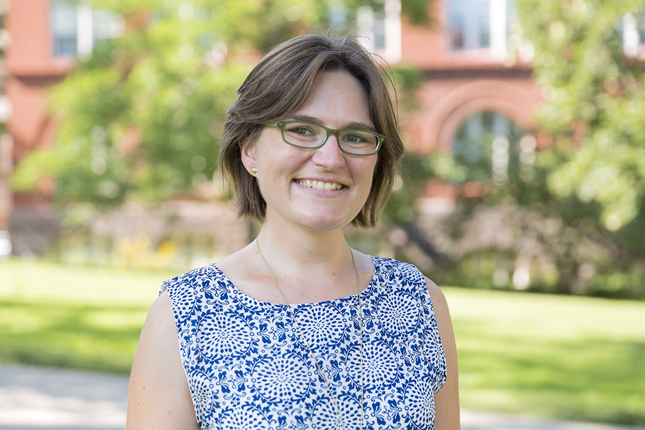
Humanities scholars develop excellent research and writing skills while amassing deep stores of knowledge, which makes them ideal employees for nonprofits and businesses alike. UW-Madison is at the forefront of a movement to help humanities scholars think about many different careers beyond academia.
Jessica Mason is the fifth scholar from UW-Madison to be selected as a Mellon/ACLS Public Fellow. This program by the American Council of Learned Societies and funded by the Andrew W. Mellon Foundation places recent humanities Ph.D.s in two-year, full-time staff positions at nonprofit and government organizations throughout the country.
This fall, Mason heads to Washington, D.C., to apply her expertise in gender studies, feminist theory and cross-cultural perspectives to a new grant-funded position at the National Partnership for Women and Families.
Mason, who earned a Ph.D. in cultural anthropology at UW-Madison in 2015, with a Ph.D. minor in Russian, Central Asian and European Studies, is one of 20 Mellon/ACLS Public Fellows for 2016.
She spoke about her scholarship and how it will translate to the public sphere.
What led you to combine interests in anthropology and feminist and gender studies?
I’ve always been interested in people, and gender is of course a huge part of that. There’s such a tremendous diversity in the ways that people live, and think, and feel, all around the world and across history, and I find a lot of hope in that. If there’s something not working in our society, we’re not stuck with that. It could always be otherwise, and we can make that change happen.
Could you tell us about your Ph.D. work?
When I started my dissertation fieldwork in early 2012, I was lucky enough to be in Moscow during some of the mass protests against rigged elections and Vladimir Putin, and I learned how LGBT and feminist activists were taking advantage of the crowds on the streets to get their message out and to show their fellow Russians that they were just citizens like everyone else, not monsters or threats to society like the state-dominated media makes them out to be. [They] were focusing on trying to influence their own fellow protesters, hoping that by the time the next revolution happens, maybe the next government will be less nationalist and more tolerant.
Tell us about a class you’ve taught as a lecturer in the Gender and Women’s Studies Department at UW-Madison.
This last spring, I put together a class on Gender and Sexuality in Conservative and Nationalist Movements, where we took a gender studies approach to political movements ranging from violent white supremacism, to mainstream U.S. conservatism, to the pro-Putin youth group Nashi. Basically half the topics were, “let’s see how an extreme and violent point of view makes sense to the people who follow it,” and half were “let’s see how we in Gender and Women’s Studies, which often gets stereotyped as liberal, actually have some common ground with conservative people.”
What was your reaction upon learning you were named a Mellon/ACLS Public Fellow?
I was absolutely thrilled, not only because the Mellon/ACLS Public Fellows program is such a great opportunity to move from academic training to public policy work, but also because the organization I’ll be joining does work right at the heart of a number of issues I care about: gender equity, economic justice and reproductive health.
What will your work at the National Partnership for Women & Families entail?
I’ll be working as an analyst on workplace policies, and more specifically working on campaigns for paid family leave and paid sick days policies at the state and federal level … I’ll be helping to build support for these policies by tracking and analyzing legislation, researching the impacts of different policies, and writing fact sheets and reports to help get information out.

